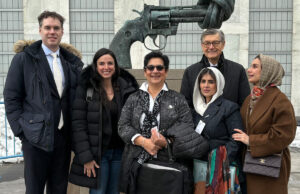Aging | Global Ageing News | Global Aging | April 27, 2017
Success Through Intergenerational Management
BY GlobalAgeing
By Prof. Dr. Wilfried Schlüter, WHZ University of Applied Sciences (Sachsen, Germany) and Prof. Dr. Katharina Oleksiw, Carinthia University of Applied Sciences (Kärnten, Austria )
Making the best possible use of the existing workforce’s potential is key as we address challenges related to recruitment and retention. Giving due consideration to the specific skills and competencies of the different generations working within an organization and knowing their attitudes, values and life circumstances can make room for new ways of working together. Workforce potential can be further developed and put to more effective use by, for instance, forming mixed-aged teams that combine the experience and skills of both older and younger generations. Promoting inclusive working conditions for all age groups can commit employees to the organization for longer while enabling a residential care home to attract new employees. Intergenerational Management can also contribute towards the prevention of personnel bottlenecks in this way.
Intergenerational Management and the formation of mixed-aged teams are necessarily based on a sound knowledge of the current age structure of the organisation’s employees. The following questions can help interpret the corresponding data:
-
How will the workforce change over the next 6 months, 3, 5 and 10 years?
-
What new appointments are planned?
-
What fluctuation rate should be assumed?
-
How many employees will retire?
These questions are also helpful if a forecast of further developments is required in addition to establishing the current age structure. An age structure forecast is an early indicator as to whether the workforce is likely to be younger, older, smaller or larger in the coming years. These forecasts provide additional information from which necessary measures can be derived. Examples of concrete measures include:
-
Developing a concept for recruiting younger employees of the Y and Z generations
-
Initiating employee retention measures
-
Establishing a corporate health management system (also for younger employees)
-
Enabling the transfer of knowledge
Historic and societal events and experiences leave their mark on every generation and influence the biography of the individual. In turn, they influence attitudes towards work and behaviors in the workplace. This is why leaders need to consider the values, needs and workplace requirements of different generations in addition to the aspects named in the preceding (also cp. table).
Economic miracle generation |
1945 – 1955 |
Baby boomers |
1956 – 1965 |
Generation X |
1966 – 1985 |
Generation Y |
1986 – 1995 |
Generation Z |
as of 1995 |
The formation of teams should begin as soon as information is levied on how each generation is represented numerically within the organization. The resulting cooperation has numerous advantages that have a positive effect on the organization:
-
Improved team dynamics: Targeted and more intensive cooperation strengthens the sense of belonging.
-
Improved ability to solve problems: Mixing different experiences and skills enables complex approaches to tackling tasks.
-
Increased capacity for innovation: Again, mixing different attitudes and perspectives increases creativity.
-
Transfer of knowledge in both directions: The exchange of experience-based knowledge and new theoretical knowledge promotes the development of each individual involved in a project.
The opportunities to create cross-generational teams within an organization are virtually unlimited and are not bound by any rules. Ultimately, leaders need to decide which form of cooperation they consider to be the most expedient for different projects.
You can learn more about Intergenerational Management at the 2017 Global Ageing Network/CURAVIVA Global Ageing Conference in Montreux, Switzlerland. On Wednesday, 20th of September, Dr. Wilfried Schlueter and Dr. Katharina Oleksiw will present six steps designed to provide guidance on how leadership skills can be extended towards the expression of “generational leadership.” Register here.

Recently Added
February 19, 2026
Statement to the United Nations: February 2026
January 22, 2026
January Statement from Vic Rayner
Translate »




